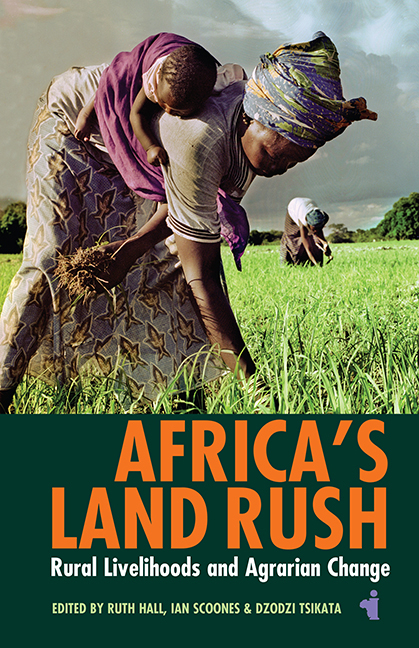Book contents
- Frontmatter
- Contents
- List of Maps, Tables & Figures
- Notes on Contributors
- Preface
- Acknowledgements
- List of Abbreviations
- 1 Introduction: The Contexts & Consequences of Africa’s Land Rush
- 2 State, Land & Agricultural Commercialisation in Kwara State, Nigeria
- 3 Recent Transnational Land Deals & the Local Agrarian Economy in Ghana
- 4 Large-Scale Land Acquisitions in Ethiopia: Implications for Agricultural Transformation & Livelihood Security
- 5 Land Deals & Pastoralist Livelihoods in Laikipia County, Kenya
- 6 Land Deals in the Tana Delta, Kenya
- 7 The State & Foreign Capital in Agricultural Commercialisation: The Case of Tanzania’s Kilombero Sugar Company
- 8 Trapped between the Farm Input Subsidy Programme & the Green Belt Initiative: Malawi’s Contemporary Agrarian Political Economy
- 9 Agrarian Struggles in Mozambique: Insights from Sugarcane Plantations
- 10 South African Commercial Farmers in the Congo
- References
- Index
Preface
Published online by Cambridge University Press: 21 May 2021
- Frontmatter
- Contents
- List of Maps, Tables & Figures
- Notes on Contributors
- Preface
- Acknowledgements
- List of Abbreviations
- 1 Introduction: The Contexts & Consequences of Africa’s Land Rush
- 2 State, Land & Agricultural Commercialisation in Kwara State, Nigeria
- 3 Recent Transnational Land Deals & the Local Agrarian Economy in Ghana
- 4 Large-Scale Land Acquisitions in Ethiopia: Implications for Agricultural Transformation & Livelihood Security
- 5 Land Deals & Pastoralist Livelihoods in Laikipia County, Kenya
- 6 Land Deals in the Tana Delta, Kenya
- 7 The State & Foreign Capital in Agricultural Commercialisation: The Case of Tanzania’s Kilombero Sugar Company
- 8 Trapped between the Farm Input Subsidy Programme & the Green Belt Initiative: Malawi’s Contemporary Agrarian Political Economy
- 9 Agrarian Struggles in Mozambique: Insights from Sugarcane Plantations
- 10 South African Commercial Farmers in the Congo
- References
- Index
Summary
After the term ‘land grabbing’ captured headlines around the world in the late 2000s, researchers embarked on a spate of new studies to understand this dramatic new trend. Africa was the focus, but in Southeast Asia and Latin America too, researchers and activists started to document large corporate takeovers of community and state land. A great deal of attention at this time revolved around how much land was being acquired, where, by whom and for what. All this was important and helped to sketch out the contours of a new era of agrarian restructuring.
The research reported in this book was conducted under the auspices of the Future Agricultures Consortium's land theme (www.futureagricultures. org/research/land). Centred on a network of Africa-based researchers, our studies set out to investigate what these ‘land grabs’ actually meant to the people directly affected. Our work from 2010 to 2014 investigated 13 cases across 8 countries in Africa.
Our interest in writing this book was to ground the narratives of a ‘land grab’ and of ‘agricultural investment’ in detailed local studies that would illuminate how these are experienced on the ground. What did these deals look like? Why did they happen in the particular places and at the particular times that they did? What transformations in rural people's lives and livelihoods were being produced? And what were the implications for future trajectories of agrarian change across the continent?
Across the studies, we chose to adopt a political economy perspective. We were motivated by a conviction that large-scale land deals in Africa must be understood in terms of the economic interests that animate national politics, and that such investments – many of which did not materialise in practice – were best understood at the intersection of global drivers and local institutions, mediated through national politics and economy. We asked: what political conditions enabled and promoted big land deals? How did investors come to identify certain sites? Who were their intermediaries? To what degree did national law and policy facilitate or shape the deals? And through what processes did local people engage with proposed deals, what were their responses, what happened to them and what did they do?
- Type
- Chapter
- Information
- Africa's Land RushRural Livelihoods and Agrarian Change, pp. xv - xviPublisher: Boydell & BrewerPrint publication year: 2015



